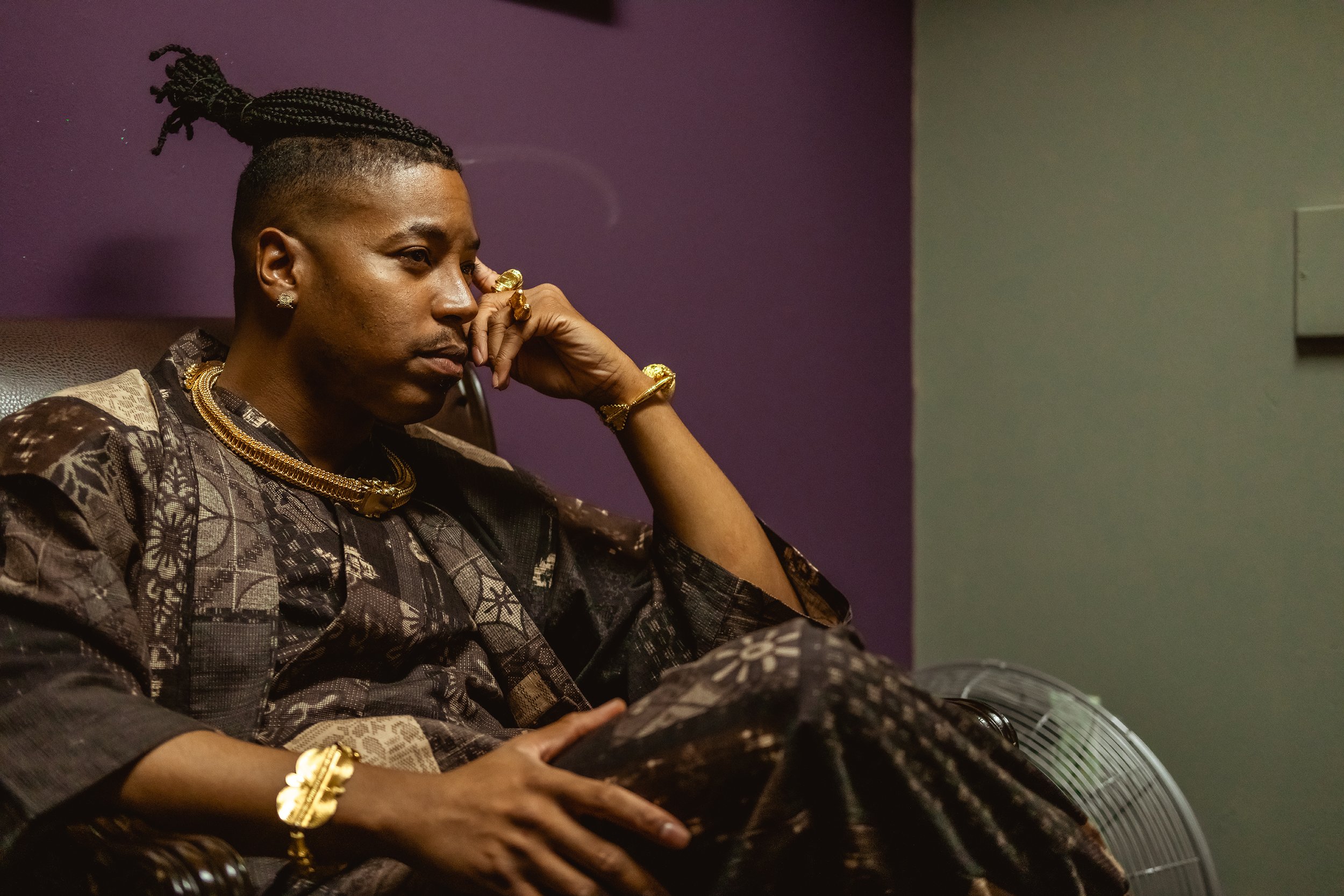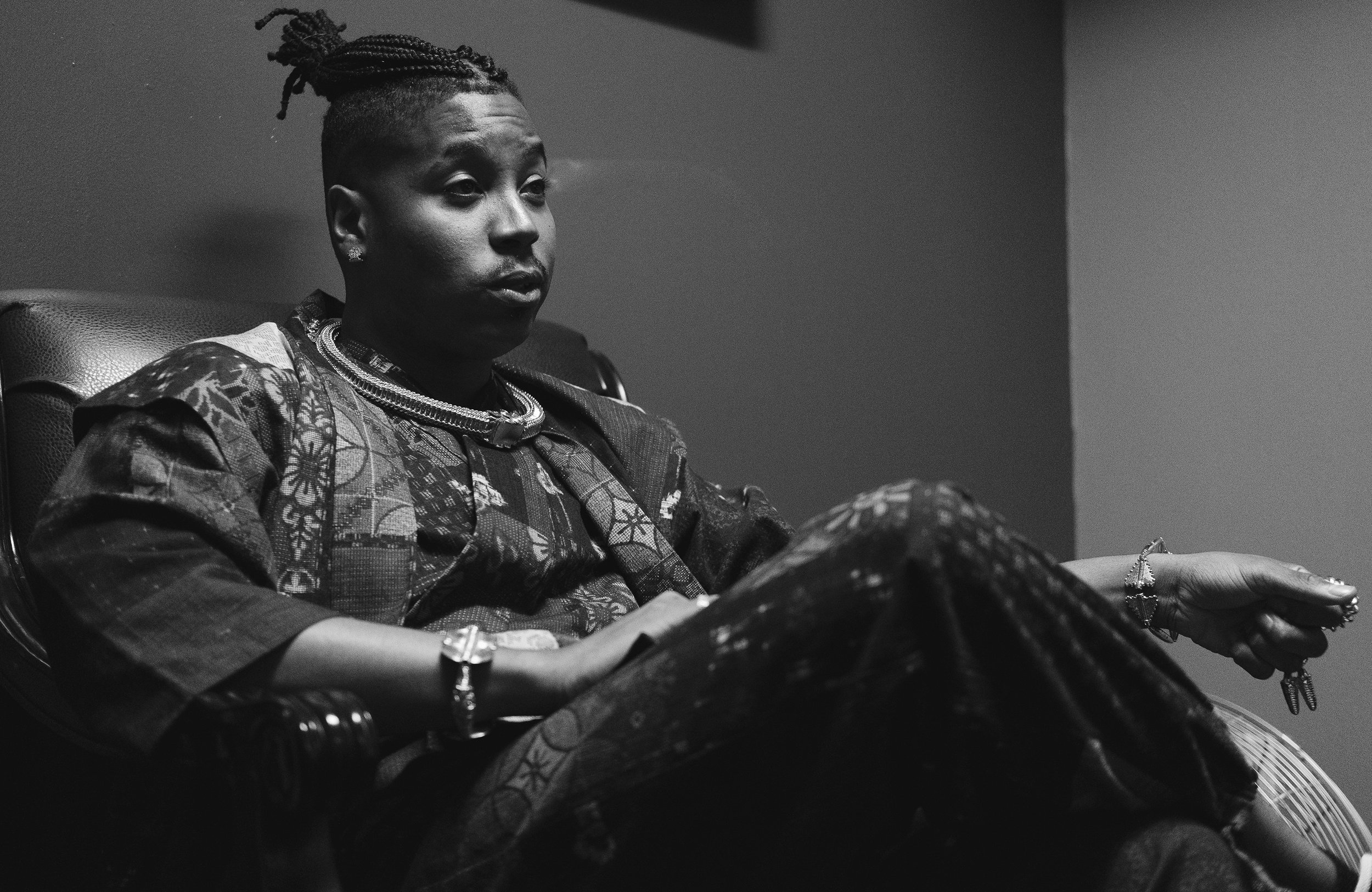
Recalling Legacy,
Decolonizing Sound
Interview Mike Nicholls | Photography by Michole Forks
Chief Xian aTunde Adjuah is an American trumpeter and composer, a two-time Edison Award winner, and the 2016 recipient of the JazzFM Innovator of the year Award. He has been nominated for five Grammy Awards. Here are his own words, recorded during a conversation with Umber in 2019 at Yoshi’s in Oakland.
**************
I am embracing the moment of progressive jazz music getting more visibility; especially when I see things happening for a lot of my peers and younger, developing musicians.
I’m also not stuffing my face with cake, you know. I don’t celebrate too early. I realize there’s still more work that needs to be done. And the thing is, a lot of times, with music, you can be raised to be lower. Based on my experience, I take a more discerning eye to what’s actually going on, to make sure that we’re looking ahead and making sure that when — if and when — the resources, the bottom falls out, that you at least own and have assets in the business to make sure.
From our generation, sonically is one thing, obviously, but I think part of my role in this moment is also to make sure that the younger generation understands the importance of value and actually owning the assets, the recording assets, ‘cause it’s like, yeah, you could be the hot one and then not so much..
And I’ll just be very honest with you, the first time I was on the cover of Billboard Magazine, I was 19 years old, had started my own record label at Berkeley, put out a record, I had the number one jazz record in the country, in 27 countries. We were 19, we didn’t know what we were doing. Three months later, I was homeless, and I’m on the cover of Billboard Magazine. The point is, most people look at that and say, how? But we understand well enough to know that you could be hot doing this, but still be on some hand-to-mouth shit.
The point is… Yeah, it’s trending, it’s cool, people love what’s going on, but who owns their masters? I’m excited about it, but I’m not gonna celebrate until the culture actually starts owning what it is that they’re putting out. I have my own set of values coming from my culture in New Orleans; in Black Indian culture in New Orleans. It’s not exactly the Abrahamic religions. My space in terms of that thing is maybe different from the average American space, really more of what I’m thinking about when I’m in that moment is really more of the ancestral thing.
And that power can be created, that is something that’s being harnessed.. It’s a beacon that’s trying to wake something that’s already inside.
When I play for an audience or when listeners hear my music, it’s their journey. For us, the music is just a conduit to help them navigate whatever they’re going through. Part of what we try to stay away from, just in terms of for me, and also a lot of the members of the band, is to me the most dangerous thing in this country really, is singular narratives of peoples. For me to try and dictate to them one story, or one feeling that it actually should be about, doesn’t make so much sense, because I’ve also had experiences where it’s, like, we can play a song, and we might be playing a song like “Klu Klux Police Department, KKPD,” and somebody might come up to me and say it reminds them when they heard it, that they thought about when they had their first daughter. Even though the song is rough and it’s got all the stuff, but a birth can be pretty traumatic. Who am I, even as the author, to tell that person that what they experienced, or what that called forth is wrong. It isn’t. That’s just their experience.
The music is really designed more as a healing agent, as we talked about before, but to also inspire thought, and to challenge those narratives, ‘cause there’s never a single one. Right now, when we walk in here, people will take a look at us, and they will conjecture that everything we think and feel is completely the same thing. We all know that we could be, it’s complete polar opposites and different, but the people that are looking are gonna come to conclusions, because that’s how the human animal is. It’s important to me to make sure that I have my feelings about what the songs are about, but to make sure that, even in terms of the energy that I’m playing with, that it’s not dictating too much.

I’ve been designing trumpets for about 15 years. I consider them the Jordans of trumpets. The reason I say the Jordan of it is for two-fold. One, we’re releasing a student line and working on partnerships right now with other companies to license basically the designs, the copyrights or whatever, to sell different ones from different brands. But the reason that I say the Jordan aspect of it is the cultural aspect of it. ‘Cause the thing is, these kids, when.. If I go back home to New Orleans and I’m sitting in Preservation Hall, one of the birthplaces of the spots for creating jazz music. If I’m sitting there in a Savile Row suit and a red rooster tie and playing a regular-looking cornet, those 8-year-olds come into the room, they automatically say, “this nigga is playing his granddad’s music.” They don’t have to think about that. You and I both know we could leave here right now and walk into a spot and I play jazz.
So, the visual correlatives are important as well. And also for the younger generation, they need to know that they can still exist in these realities and author their own narratives in it. When someone sees that horn, they’ve never seen that before. Whether or not it’s somebody our age or a kid, when they see that, they know it’s something that belongs to them because it’s new. That’s also part of what it is that we’re trying to build. When they see this stuff, they need to think, you should have the same vested interest in the swag and the character of creative improvisers, jazz musicians as you do as hip-hop, as you do as R&B. It’s actually the same culture, but just different. Part of what we’re doing with the visual correlatives, even in terms of the swag, is I’m walking around with adornments based out of West Africa. When people see that, it automatically makes them realize, Well, damn! Bling is actually older than Lil Wayne. Those are really important in terms of creating counter-narratives to the one that our culture gets brushed with. So the horn is tied into it.
DECOLONIZING SOUND
There’s more work that needs to be done in terms of decolonizing sound. Each record I put out is a completely different listening experience because of our intention to make sure that you can hear the harmony in the rhythm. The harmony in rhythm as a means of also breaking down some of those tropes that people have about our culture. That’s a really important thing to me. Stretch Music [a studio album released by Chief Xian on Sept. 18, 2015] is really more about trying to acculturate as many different vernacular and modes of operating in music into a creative, improvised space. What we’re working on with the recall thing is actually different because it’s more focus.
Stretch Music says I wanna take something from an Indian Raga, a polish folk song, the rhythms of the Suriname and French Guiana and collapse all those things together. The music that’s really more about de-colonizing the sound is more intentional in its African-ness. That’s where we’re kind of headed, for me a little bit, and you hear that in contemporary music as well. The rhythms are getting more sophisticated, but it’s because.. Because you have more independent music, you have less folks from the dominant culture saying that that’s not gonna work, it’s not palatable, ‘cause it is too much mumbo-jumbo rhythms or whatever. As an example, you can’t tell an independent artist he’s not bouncing it off of someone. You feel me? There’s not an accountant telling him he can’t do that. It’s gonna sound more of what he is. I think that’s the one thing for me, and then I think for the larger culture of music, I think part of what’s happening is that.
Part of our intention with Stretch Music and all of that, obviously a second-century jazz, synonyms really on some level. But the idea is to unify everyone under one understanding of music. And the reason that I say that is that people are constantly talking about what’s wrong, what doesn’t go right. Everyone is trying to figure out what has the most powerful communicative value in terms of how we actually interact with each other. Everyone’s constantly talking about what needs to be re-evaluated. The thing that we always talk about is the fact that it seems like everyone’s talking but no one’s listening ‘cause we’re not really speaking the same languages. Well, the universal language exists.
You don’t actually have to look for it, you know what it is already. A lot of the healing and the things that we actually say that we want to do, there’s a perfect conduit to actually do it. If a generation actually decides that they’re gonna sit down, fortify themselves and say, We’re gonna concentrate on unifying and creating a Rosetta Stone for all of this musical language and that’s basically what we’re doing here.
MY VISION FOR THE NEXT 10 YEARS
When I say, “de-colonizing sound,” part of what I’m dealing with is that nine times out of 10, when we talk about music in the west.. It’s all good. When we talk about music in the west, there’s this higher value on music that has a more harmonic and melodic content.
Part of what we’re trying to get to is to develop a sound that shows you that all of the harmonic and melodic tenets that you, that people in the West, perceive as this high-brow, highfalutin’ thing that makes using more valuable, that actually exists in tribal spaces to a degree that actually goes beyond a lot of that. It’s also partly connected to a larger narrative as well.
Which is like in creative improvised music or jazz music. But the narrative to codify the music as what America’s classical music sort of goes like this. “Jazz is West African rhythms and European harmony.” That’s completely false. If you go to Bamako right now, those boys can play songs. They play traditional songs from 400 years ago and it sounds like the Delta Blues.
To say that the music is only those two parts, basically completely effaces the melodic and harmonic realities that exist in West African music. So this is a generation that’s going to make sure that we’re being clear about what has happened to the music. That way, we can walk forward in a better space because we’re being honest about what it is that you’re hearing. U
To learn more about Chief Xian visit www.chiefadjuah.com | Follow on Instagram: @chiefadjuahofficial



